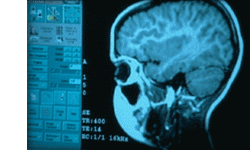 | 
 In "Medicating Kids," FRONTLINE examines the dramatic increase in the prescription of behavior-modifying drugs for children. Are these medications really necessary--and safe--for young children, or merely a harried nation's quick fix for annoying, yet age-appropriate, behavior?
In "Medicating Kids," FRONTLINE examines the dramatic increase in the prescription of behavior-modifying drugs for children. Are these medications really necessary--and safe--for young children, or merely a harried nation's quick fix for annoying, yet age-appropriate, behavior?
FRONTLINE follows four Denver, Colo., families over the course of one year. From school complaints of disruptive behavior and parent-teacher conferences through multiple doctors, medications, and dosages, "Medicating Kids" offers an intimate portrait of how American families grapple with the decision to medicate their children and the stress such decisions place on the family. Viewers meet Nicolas DuPerret, barely three years old, whose doctor suspected he might have ADHD; Noelle Demo, 13, whose fidgeting and disruptive behavior resulted in poor grades and school suspensions; Alex McCarty, 12, whose ADHD was compounded by severe depression; and Robin Day, 16, who has endured multiple diagnoses, one hospitalization, and ultimately his parents' divorce.
Interwoven with these stories are examinations of the role of doctors, advocacy groups, and pharmaceutical companies in advancing the medication trend, as well as a look at the strong anti-medication movement that has filed lawsuits charging that drug companies and doctors have conspired to exaggerate the number of ADHD cases in an attempt to boost drug sales.
"You can't ignore the fact that there is a lot of over-diagnosis of ADHD," says FRONTLINE producer Martin Smith. "But we've tried to look at both sides of the issue. There are no easy answers here."
Indeed, the case of each child profiled in the documentary is unique. Despite school complaints and the psychologist's opinion, for example, Nicolas DuPerret's parents decided not to put Nicolas on medication, viewing their son's behavior as "intense," but normal. "[Medication is] just a quick fix," says Nicolas's father, Cyrille. "We would never do that."
But for other families, medication appears to be a godsend.
Before taking Ritalin and later Adderall, Noelle Demo was getting Ds and Fs on her report card. She had also been suspended twice for fighting with another student. Her teachers urged medication. Soon thereafter, the Ds and Fs turned into As and Bs, while her improved concentration had a positive impact on her gymnastics performance.
The medical community, however, still is unable to explain why these medications help relieve ADHD symptoms in many children.
"We still don't really know much about how Ritalin or Dexedrine or Adderall work," Dr. Xavier Castellanos tells FRONTLINE. The head of ADHD research at the National Institute of Mental Health, Castellanos freely admits that much remains unknown about the nature and cause of ADHD. "The problem is," he says, "we're searching in the dark and don't know where that clue is going to be."
This lack of basic understanding about the nature of ADHD concerns some parents. Others are concerned about the role played by pharmaceutical companies, which have not only provided financial support to ADHD advocacy groups such as CHADD (Children and Adults with Attention Deficit Disorder) but also paid physicians to make speaking appearances to raise awareness of ADHD. Such support, critics claim, is an attempt to boost diagnoses of ADHD--and thereby drug sales.
For parents, meanwhile, the decision to place their child on medication remains a difficult one. In "Medicating Kids," even the parents who credit medication with "saving" their children admit wrestling long and hard with the decision.
"Of course I'd not want [Alex] to take medication if he didn't have to," Diane McCarty says. "But for Alex it's working ... and I know in my heart I've gone the distance and I'm helping my son."

home · watch the program · four families · adhd drugs · adhd · backlash
readings · adhd in schools · interviews · discussion · the producers · viewers' guide
synopsis · tapes & transcripts · press reaction · credits
frontline · wgbh · pbs online
pill photograph copyright ©2001 photodisc all rights reserved
web site copyright WGBH educational foundation
|